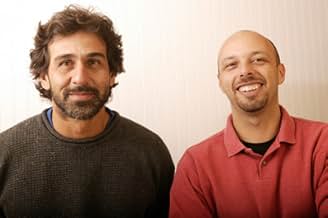IMDb रेटिंग
7.8/10
8.8 हज़ार
आपकी रेटिंग
अपनी भाषा में प्लॉट जोड़ेंOn June 12, 2000, a young man with a gun took the passengers aboard Bus 174 in Rio de Janeiro, Brazil hostage. This documentary examines the event itself, the resulting media frenzy, the pol... सभी पढ़ेंOn June 12, 2000, a young man with a gun took the passengers aboard Bus 174 in Rio de Janeiro, Brazil hostage. This documentary examines the event itself, the resulting media frenzy, the police response, and the perpetrator's background.On June 12, 2000, a young man with a gun took the passengers aboard Bus 174 in Rio de Janeiro, Brazil hostage. This documentary examines the event itself, the resulting media frenzy, the police response, and the perpetrator's background.
- पुरस्कार
- 21 जीत और कुल 9 नामांकन
Sandro do Nascimento
- Self
- (आर्काइव फ़ूटेज)
Geísa Firmo Gonçalves
- Self
- (आर्काइव फ़ूटेज)
कहानी
क्या आपको पता है
- ट्रिवियाIncluded among the 1,001 Movies You Must See (Before You Die) (2014), edited by Steven Schneider.
- कनेक्शनFeatured in 50 Documentaries to See Before You Die: Episode 4 (2011)
फीचर्ड रिव्यू
Rio de Janeiro, June 12th 2000: it's Valentine's day in Brazil. In Rio's only favela-free middle-class neighborhood (Jardim Botânico), a young black man, drugged and armed, hijacks bus 174 with a dozen passengers in one of Rio's busiest avenues in mid-afternoon. What would have been just one more event in Rio's violence statistics turns out to be a nationwide live-TV horror show. The traffic stops, the elite police surround the area, the bandit threatens to shoot the passengers and then kill himself. The "negotiation" lasts four hours, involves even the governor of Rio de Janeiro state, in what became one of the highest rating events on Brazilian TV history and exposed one of the most stupid and catastrophic police strategies ever devised.
As the negotiation goes on, TV reporters find out that the young hijacker is in fact a survivor of one of Rio's most horrendous crimes: as a young street kid he had escaped being murdered by policemen in the infamous Candelária child mass murder in the early 90s and, instead of being protected by the government, he was sent to a reform unit under appalling conditions (the facilities of the reform unit are some of the most shocking scenes in "Bus 174"). He had also, as a young child, witnessed bandits stab his mother being to death by bandits in front of him.
This powerful documentary includes live TV scenes of the actual hijack and its tragic denouement -- the shooting of one the victims and the bandit's arrest and subsequent assassination by the police, reported then as suicide and eventually proved in court to be manslaughter. It also contains interviews with social workers and sociologists (some of them insightful, others the usual B.S.), shocking interviews with bandits and street kids who knew him, and the testimony of some of the passengers and policemen who were part of the action. If this were a work of fiction, it would be hard to believe, but it's all true.
The opening sequence is especially powerful and revealing: it's one uninterrupted aerial shot of Rio's beautiful shoreline, leading to the imposing mansions of the wealthy, then up to the forest on top of Vidigal hill -- and suddenly the camera tilts downwards and, like a punch in the jaw, we see the immense favela of Rocinha, the largest in Latin America, with some 200,000 inhabitants -- all of that part of the same neighborhood, high-profile wealth and destitute poverty co-existing side by side, sharing the same few square miles.
This is a film that poses a series of difficult questions on violence, public education, social welfare, child abuse, imprisonment policies, juvenile crime, police training and strategy, police abuse, drug addiction, TV ethics and responsibility, the role of social work and rehab, poverty and injustice. No easy answers or solutions here, but very important and disturbing questions all the same.
Do not watch this if you're in search of light entertainment! On the other hand, if you want to know a little bit about what it's like to live in a big city in the Third World -- where the rich and the poor are simultaneously so close (geographically) and far apart (in human and social rights) at the same time -- don't miss it!! If you live in a rich country, prepare to be shocked.
As the negotiation goes on, TV reporters find out that the young hijacker is in fact a survivor of one of Rio's most horrendous crimes: as a young street kid he had escaped being murdered by policemen in the infamous Candelária child mass murder in the early 90s and, instead of being protected by the government, he was sent to a reform unit under appalling conditions (the facilities of the reform unit are some of the most shocking scenes in "Bus 174"). He had also, as a young child, witnessed bandits stab his mother being to death by bandits in front of him.
This powerful documentary includes live TV scenes of the actual hijack and its tragic denouement -- the shooting of one the victims and the bandit's arrest and subsequent assassination by the police, reported then as suicide and eventually proved in court to be manslaughter. It also contains interviews with social workers and sociologists (some of them insightful, others the usual B.S.), shocking interviews with bandits and street kids who knew him, and the testimony of some of the passengers and policemen who were part of the action. If this were a work of fiction, it would be hard to believe, but it's all true.
The opening sequence is especially powerful and revealing: it's one uninterrupted aerial shot of Rio's beautiful shoreline, leading to the imposing mansions of the wealthy, then up to the forest on top of Vidigal hill -- and suddenly the camera tilts downwards and, like a punch in the jaw, we see the immense favela of Rocinha, the largest in Latin America, with some 200,000 inhabitants -- all of that part of the same neighborhood, high-profile wealth and destitute poverty co-existing side by side, sharing the same few square miles.
This is a film that poses a series of difficult questions on violence, public education, social welfare, child abuse, imprisonment policies, juvenile crime, police training and strategy, police abuse, drug addiction, TV ethics and responsibility, the role of social work and rehab, poverty and injustice. No easy answers or solutions here, but very important and disturbing questions all the same.
Do not watch this if you're in search of light entertainment! On the other hand, if you want to know a little bit about what it's like to live in a big city in the Third World -- where the rich and the poor are simultaneously so close (geographically) and far apart (in human and social rights) at the same time -- don't miss it!! If you live in a rich country, prepare to be shocked.
टॉप पसंद
रेटिंग देने के लिए साइन-इन करें और वैयक्तिकृत सुझावों के लिए वॉचलिस्ट करें
- How long is Bus 174?Alexa द्वारा संचालित
विवरण
बॉक्स ऑफ़िस
- US और कनाडा में सकल
- $2,17,201
- US और कनाडा में पहले सप्ताह में कुल कमाई
- $8,625
- 12 अक्तू॰ 2003
- दुनिया भर में सकल
- $2,22,506
- चलने की अवधि2 घंटे 30 मिनट
- रंग
- ध्वनि मिश्रण
- पक्ष अनुपात
- 1.85 : 1
इस पेज में योगदान दें
किसी बदलाव का सुझाव दें या अनुपलब्ध कॉन्टेंट जोड़ें






















